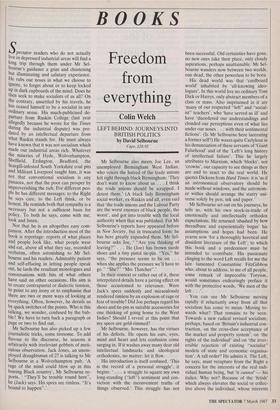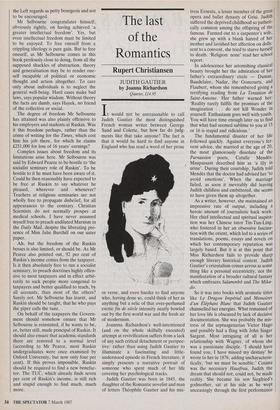BOOKS
Freedom from everything
Colin Welch
LEFT BEHIND: JOURNEYS INTO BRITISH POLITICS by David Selbourne Cape, £10.95 Spectator readers who do not actually live in depressed industrial areas will find a long trip through them under Mr Sel- bourne's guidance a grim and chastening but illuminating and salutary experience. He rubs our noses in what we choose to ignore, to forget about or to keep locked up in dark cupboards of the mind. Does he then seek to make socialists of us all? On the contrary, unsettled by his travels, he has ceased himself to be a socialist in any ordinary sense. His much-publicised de- parture from Ruskin College (last year allegedly because he wrote for the Times during the industrial dispute) was pre- dated by an intellectual departure from what Ruskin stands for. He must always have known that it was not socialism which made our industrial areas rich. Whatever the miseries of Hyde, Wolverhampton, Sheffield, Erdington, Bradford, the Scargill-infested South Yorkshire coal pits and Militant Liverpool taught him, it was not that conventional socialism is any panacea, nor that the poor can prosper by improverishing the rich. For different peo- ple he has different messages: to the Right he says care, to the Left think, or be honest. He reminds both that sympathy is a necessary but not a sufficient basis for policy. To both he says, come with me, look and listen.
Not that he is an altogether easy com- panion. After the introduction most of the book is reportage: reports of what places and people look like, what people wear and eat, above all what they say, recorded verbatim, often astonishing to Mr Sel- bourne and his readers. Admirably patient and self-effacing in letting people speak out, he lards the resultant monologues and conversations with bits of what others have said on other occasions. His aim is to create contrapuntal or dialectic tension, to point to any irony or to emphasise that there are two or more ways of looking at everything. Often, however, he derails us by quick switches of the points. Who is this talking, we wonder, confused by the bab- ble? We have to turn back a paragraph or page or two to find out.
Mr Selbourne has also picked up a few journalistic tricks, some tiresome. To add flavour to the discourse, he seasons it arbitrarily with irrelevant gobbets of meti- culous observation. Jack Jones, an unem- ployed draughtsman of 27 is talking to Mr Selbourne in a Wolverhampton pub. 'A rage of the mind could blow up in this louring Black country', Mr Selbourne re- ports. ' "They'll be trouble round here", he (Jack) says. His specs are rimless. "It's bound to happen".' Mr Selbourne also meets Joe Lee, an unemployed Birmingham West Indian, who voices the hatred of the trade unions felt right through black Birmingham: 'They don't want to know about us . . . I think the trade unions should be scrapped. I detest them.' (A black lady Birmingham social worker, ex-Ruskin and all, even said that 'the trade unions and the Labour Party are the worst enemies of black people, the worst', and got into trouble with the local authority when that was published. For Mr Selbourne's reports have appeared before in New Society, but in truncated form: he has here greatly expanded them. Mr Sel- bourne asks Joe, "Are you thinking of leaving?" . . . He (Joe) has brown suede shoes and a tiny pistol tie-pin. "Yes," he says, "the pressure seems to be on . . when she applies the pressure we'll have to go." "She?" "Mrs Thatcher": In their context or rather out of it, these interpolated details have a jarring effect on those accustomed to relevance. Were Jack's specs suddenly and miraculously rendered rimless by an explosion of rage or fear of trouble? Did Joe perhaps regard his shoes and tie-pin as suitable accessories for one thinking of going home to the West Indies? Should I reveal at this point that my specs are gold-rimmed?
Mr Selbourne, however, has the virtues of his defects. He opens his ears, eyes, mind and heart and lets confusion come surging in. If it washes away many dear old intellectual landmarks and ideological orthodoxies, no matter: let it flow.
His introduction is itself confused. 'This is the record of a personal struggle', it begins: . . . a struggle to square my own long-standing ("left") sentiment and con- viction with the inconvenient truths of things observed.' This struggle has not been successful. Old certainties have gone, no new ones take their place, only cloudy aspirations, perhaps unattainable. Mr Sel- bourne wanders now between two worlds, one dead, the other powerless to be born.
His dead world was that 'cardboard world' inhabited by 'all-knowing ideo- logues'. In this world live no ordinary Tom Dick or Harrys, only abstract members of a class or mass. Also imprisoned in it are `many of our respected "left" and "social- ist" teachers', who 'have served us ill' and have 'disordered our understandings and clouded our perceptions even of what lies under our noses . . . with their sentimental fictions'. (Is Mr Selbourne here lacerating a former self?) He waxes quite Carlylean in his denunciation of these servants of 'Giant Falsehood' and of the 'Left's long history of intellectual failure'. This he largely attributes to Marxism, which 'blocks', not `crowns', our capacity to see things as they are and to react to the real world. He quotes Dickens from Hard Times: it is 'as if an astronomical observatory should be made without windows, and the astronom- er within should arrange the starry uni- verse solely by pen, ink and paper.'
Mr Selbourne set out on his journeys, he tells us, with his own stock-in-trade of emotionally and intellectually orthodox expectations. He returned 'abashed by how threadbare and experientially bogus' his assumptions and hopes had been. He yearns now 'for a thoroughly heretical and dissident literature of the Left', to which this book and a predecessor must be intended to contribute. His passionate clinging to the word Left recalls for me the late lamented Constantine FitzGibbon who, about to address, to me of all people, some remark of impeccable Toryism, would sometimes endearingly preface it with the protective words, 'We men of the left . .
You can see Mr Selbourne moving rapidly if reluctantly away from all that socialism has come to mean. Moving to- wards what? That remains to be seen. Towards a new radical revised socialism, perhaps, based on 'Britain's industrial con- traction, on the cross-class acceptance of the market and property system', on 'the rights of the individual' and on 'the irrev- ersible rejection of existing "socialist" models of state and economic organisa- tion'. A tall order? He admits it. The Left, he says, must recapture from the Right a concern for the interests of the real indi- vidual human being, but 'it cannot' — his italics. Why not? Because of the 'fetish' which always elevates the social or collec- tive above the individual, whose interests the Left regards as petty bourgeois and not to be encouraged.
Mr Selbourne congratulates himself, obviously rightly, on having achieved 'a greater intellectual freedom'. Yes, but even intellectual freedom must be limited to be enjoyed. To free oneself from a crippling ideology is pure gain. But to free oneself, as Mr Selbourne comes in this book perilously close to doing, from all the supposed shackles of abstraction, theory and generalisation may be to render one- self incapable of political or economic thought and action altogether. To care only about individuals is to neglect the general well-being. Hard cases make bad laws, says popular wisdom. Without theory the facts are dumb, says Hayek, no friend of the collective or social.
The degree of freedom Mr Selbourne has attained was also plainly offensive to his employers and students at Ruskin. Was it this freedom perhaps, rather than the crime of writing for the Times, which cost him his job there, for which he claims £251,000 for loss of 16 years' earnings?
Complex issues about freedom and its limitations arise here. Mr Selbourne was said by Edward Pearce to be hostile to 'the socialist seminary role of Ruskin'. To be hostile to it he must have been aware of it. Could he then reasonably have expected to be free at Ruskin to say whatever he pleased, wherever and whenever? Teachers at religious seminaries are not wholly free to propagate disbelief, for all appearances to the contrary. Christian Scientists do not normally prosper at medical schools. I have never assumed myself free to preach undiluted Marxism in the Daily Mail, despite the liberating pre- sence of Miss Julie Bu_ rchill on our sister paper.
Ah, but the freedom of the Ruskin bosses is also limited, or should be. As Mr Pearce also pointed out, 92 per cent of Ruskin's income comes from the taxpayer. Is it then absolutely free to run a socialist seminary, to preach doctrines highly offen- sive to most taxpayers and in effect arbit- rarily to sack people more congenial to taxpayers and better qualified to teach, by all accounts, than most of the others? Surely not. Mr Selbourne has learnt, and Ruskin should be taught, that he who pays the piper calls the tune.
On behalf of the taxpayers the Govern- ment should somehow ensure that Mr Selbourne is reinstated, if he wants to be, or, better still, made principal of Ruskin. It should also ensure that academic standards there are restored to a normal level (according to Mr Pearce, most Ruskin undergraduates were once examined by Oxford University, but now only four per cent). If this proves impossible, Ruskin should be required to find a new benefac- tor. The TUC, which already finds seven per cent of Ruskin's income, is still rich and stupid enough to find much, much more.



























































 Previous page
Previous page